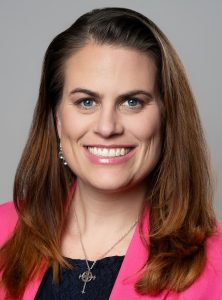Those of us who grew up in more conservative churches have found freedom in the exvangelical movement. Liberation Theology, multiple ways to interpret the Bible, and new theories that help us realize the Triune God is much bigger than we could comprehend. Yet, while we’ve learned so much about the freeing, liberated, just God, sometimes we find ourselves still trapped in patterns of thinking that are a holdover from fundamentalist spaces.
This is what I understand to be progressive Christian fundamentalism.
Progressive Christian fundamentalism is practiced by people who were evangelical Christians and have gone through deconstructing but still struggle with living out a faith that aligns with their beliefs. We identify ourselves by who we are against, rather than who and what we are for. In our excitement to embrace an expansive form of Christianity, we become gatekeepers of others’ beliefs and actions.

Kate Hanch
In addition, we may not change our practices to reflect our beliefs, opting instead for virtue signaling.
For instance, while we affirm white supremacy is evil, we may rarely read or engage (if at all) people of color or voluntarily give up our power or prestige to people of color. We also may tokenize those who are at the margins in order to gain credibility in progressive spaces.
Ultimately, progressive fundamentalism leads to upholding the status quo and Christian celebrity, albeit with kinder language.
One characteristic of progressive fundamentalism includes not citing people already doing the work and not centering people at the margins.
We can conduct a self-audit of our conversation partners, who we cite in sermons, who we look to as examples, and who we reference when we talk about God. We can ask what kind of power they hold in society and to what extent their background aligns with ours.
My friend Robert Monson, a Ph.D. student at Iliff School of Theology, says, “I rarely (speak) about deconstruction because I am so cognizant of how people have been harmed in church spaces. In wanting a table where everyone can be heard, it does necessitate that room has to be made. Black folks aren’t consulted in many of these conversations and when they are it is typically in a token way. I hate it.”
If white people like me rarely cite Black people, or only cite them to make ourselves look better, we perpetuate progressive fundamentalism. Who we read and uplift shapes us as the Holy Spirit transforms us into the likeness of Christ.
“If white people like me rarely cite Black people, or only cite them to make ourselves look better, we perpetuate progressive fundamentalism.”
Another aspect of progressive Christian fundamentalism is only criticizing the group we once were part of and never doing self-reflection on our own history, creating an “us vs. them” binary.
I’ve seen this in my own life with the Cooperative Baptist Fellowship, where I was ordained. Understandably, the newly formed denomination grieved the loss of power and freedom they had in the Southern Baptist Convention. Yet, in their attempt to identify themselves, they rooted their identity in what they were not, rather than who they were. And oftentimes, that identity did not live up to reality.
My friend Andrew Gardner, a Baptist historian, writes on the formation of the CBF: “Women are less important than the power men held in Baptist life. No wonder so many women question their calling in Baptist life. Our moderate and progressive forebearers were clear: You were only affirmed if you received a call. These moderates … took no leadership in affirming women in ministry. They simply did not oppose it. While men remained affirmed in their vocational calling whether a church called them or not, women’s affirmation was contingent upon whether a church would call them to the pulpit.”
Many women and gender nonconforming people felt and still feel this deeply.
Connected to the lack of critical thinking, progressive fundamentalists still are enamored by traditional power structures upheld in conservative spaces.
These power structures may make gestures toward diversity or inclusion but do not look at the situation that exacerbates inequity. These power structures can resort to tokenism, like asking one woman or one queer person to be on a panel about inclusion. Inequities remain across Mainline denominations, including the United Methodist Church where I serve.
Progressive faith becomes a performance. If we have gained influence or prestige in the system, why question the system, as it has benefitted us?
Having the power to influence isn’t inherently bad. However, influencing without reflecting, repenting, learning and acting can lead to arrogance and a dismissal of how the Spirit has already been working at the margins, or how the Spirit is working at our own hearts. And this, in turn, keeps us beholden to the status quo with a nice smile.
The God who blessed sex workers, hung out with tax collectors, and flipped tables wants more for the world than that.
Kate Hanch serves as associate pastor of youth and families at First St. Charles United Methodist Church in Missouri. She earned a master of divinity degree from Central Baptist Theological and a Ph.D. in theology and ethics at Garrett-Evangelical Theological Seminary. Her first book, Storied Witness, conducts a careful reading of 19th-century Black women preachers’ narratives and their texts, both written and spoken, to make explicit their theology. She lives in O’Fallon, Mo.
Related articles:
On the SBC, Alliance and CBF and lost causes
Where have all the evangelical convictions gone? | Opinion by Bill Leonard


